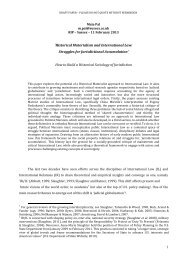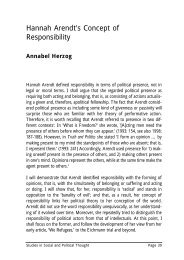Civil Society Theory and Euro-Nationalism - University of Sussex
Civil Society Theory and Euro-Nationalism - University of Sussex
Civil Society Theory and Euro-Nationalism - University of Sussex
You also want an ePaper? Increase the reach of your titles
YUMPU automatically turns print PDFs into web optimized ePapers that Google loves.
CIVIL SOCIETY THEORY AND EURO-NATIONALISM<br />
When the moral assertion is placed in the context <strong>of</strong> the historical<br />
schema it turns out that the law referred to is not the product <strong>of</strong> the<br />
objective ethical think-tank envisaged in some conceptualisations<br />
<strong>of</strong> civil society. 27 The law being referred to via the historical schema<br />
is that embodied in the actual constitutional arrangements <strong>of</strong> those<br />
states, such as Italy, which are said to have followed the model <strong>of</strong><br />
revolutionary France. However, if the history <strong>of</strong> imperialist France<br />
<strong>and</strong> fascist Italy had been given more prominence, this would have<br />
shown that constitutional arrangements are <strong>of</strong>ten the outcome <strong>of</strong><br />
violence <strong>and</strong> imposition as much as negotiation <strong>and</strong> agreement. It<br />
is not unknown for them to undergo frequent radical change <strong>and</strong><br />
there has been no cut-<strong>of</strong>f point at which states can be said to have<br />
achieved the definitive universal constitution. Indeed the extent<br />
to which the Spanish constitution has overcome the legacy <strong>of</strong><br />
Franco’s dictatorship is still an issue in contemporary politics. 28<br />
And in this regard ‘abstraction’ can also be understood, within the<br />
globalisation <strong>of</strong> politics, as the distance between the ‘foreign’<br />
consumer <strong>of</strong> the discourse <strong>and</strong> the material reality being subjected<br />
to political analysis. 29<br />
The conception <strong>of</strong> the law implicit in the moral assertion about<br />
equality is that <strong>of</strong> a static abstraction divorced from the historical<br />
26 It has been argued that the study <strong>of</strong> Catalan nationalism Catalanismo i Revolució<br />
Burguesa by one <strong>of</strong> the framers <strong>of</strong> the Spanish constitution, Jordi Solé Tura, uses<br />
this same technique <strong>of</strong> presenting what is essentially a political thesis as empirical<br />
history (Antoni Estradé, ‘El tractament del Nacionalisme Catalá en les Ciències<br />
socials’ in Nacionalismes i Ciencies Socials: Colloqui Internacional Barcelona,<br />
Fundació Jaume B<strong>of</strong>ill, Barcelona: Editorial Mediterrània, 1996, p. 18).<br />
27 Such as J.L. Cohen <strong>and</strong> A. Arato, <strong>Civil</strong> <strong>Society</strong> <strong>and</strong> Political <strong>Theory</strong>. Cambridge,<br />
Massachusetts: MIT Press, 1982.<br />
28 In his book Jubilar la Transició (Barcelona: La Humanitat Columna, 1998),<br />
the secretary <strong>of</strong> the Catalan Left Republican Party (ERC) argues that a second<br />
transition is needed to finally democratise the state <strong>and</strong> overcome the Francoist<br />
legacy.<br />
29 The ‘Spanish’ newspaper most commonly found on ‘foreign’, i.e. British,<br />
newspaper st<strong>and</strong>s is almost certainly El País, which published Tortella’s article<br />
<strong>and</strong> which has been accused <strong>of</strong> being a forum for banal Spanish state nationalism<br />
(Arcadi Calzada <strong>and</strong> Carles Llorens, Reconstrucció Nacional. Barcelona: Edicions<br />
Destino, 1995, p. 99).<br />
39
















